- Home
- Sherry Thomas
Not Quite a Husband Page 5
Not Quite a Husband Read online
Page 5
At night he lay awake and thought of her prim little hats, her utilitarian walking boots, and the buttons that strained just slightly at the rise of her breasts. Thought of her unkissed lips, unlicked nipples, unpenetrated thighs.
Then his lust had gotten away from him at the soiree musicale. He’d kissed her, not once, but twice, where any one of a hundred guests could have walked in on them.
He had no idea what to do next. Should he call on her and apologize? Should he call on her and not apologize? And it wasn’t a simple matter to call on her, since she worked and kept no at-home days.
So here he was, on an overcast, drizzling London morning, too cold and dismal to be called spring, pacing his brother’s library in a strange agitation, flipping the card she’d given him between his fingers. Miss Bryony Asquith. Internist. Anesthesiologist. Senior House Surgeon—New Hospital for Women. Lecturer—London School of Medicine for Women.
Someone knocked. “Sir, Miss Asquith would like to know if you are home,” said Jeremy’s butler.
“Which Miss Asquith?” It was a stupid question to ask. Only the eldest daughter of the family was referred to solely by her surname.
He tried to think why she’d come to see him. Probably to berate him, which he deserved, of course, but he’d rather that she not be displeased with him. Perhaps she had a lecture of her own to give somewhere and wished to invite him to attend. But then again that could have been easily done with a note.
He gave up and told the butler to show her in.
She was so pretty. Raven hair, porcelain complexion, a natural blush of the palest rose on her cheeks. His heart had taken to beating faster when he was around her. And he was all too aware of the indent of her upper lip, the richness of her lower lip, the whole shape and curve and softness of her mouth.
They spent a minute or so standing in the drawing room, exchanging platitudes. He offered her a seat; she thanked him but made no move. He offered her tea; she turned it down outright.
He gave her a mock severe look. “You don’t want a seat and you don’t want tea. Is there anything you do want, Miss Asquith?”
She cleared her throat. “Well, I was rather hoping I could offer you something that you would want.”
“Indeed?” He had no idea what that could be but he smiled all the same. At least she wasn’t unhappy with him. “Well, go on, I’m listening.”
She launched into an analysis of their finances, logistics, and temperaments. It took him at least three minutes to understand that she was speaking in the context of marriage. She believed their differing dispositions would complement each other, her quiet a natural foil to his brio. Their schedules would align nicely, as she was sure he needed plenty of time for his work, which he could do while she was at the hospital. And she would bring with her Thornwood Manor—which, having once been part of her mother’s dowry and stipulated in the marriage contract to go to the first Mrs. Asquith’s offspring, actually belonged to her—along with considerable monetary assets.
In his daze, it was some time before he realized that she’d stopped speaking.
“Have I shocked you very much?” she murmured.
“Yes, rather,” he said slowly.
She sat down at last, in a Louis XV chair before the fireplace. “Not too horribly, I hope.”
“No, not too horribly.”
“Is it something you could consider then?”
It was definitely something he could consider. But marriage had been only a glimmer in his eye. He was three weeks short of twenty-four. And he’d thought it would take at least another year for the two of them to get to know each other properly.
“I will consider it most earnestly—you know I’ve nothing but the greatest esteem for you.”
She bit her lip. “Here’s something else you should take into consideration then. It is highly unlikely that I could have children.”
He was stunned. “Are you sure?”
“Unfortunately.” She looked away from him. “Do you like children?”
“Yes.” He did like children, very much. He spoiled his nieces and nephews rotten as often as he could.
Her eyes dimmed. “Then you should probably say no right now. Otherwise, it would be a hardship for you.”
How ironic that upon being presented with his heart’s desire, he was also presented with one of the starker choices a man could face. “May I have some time to think about it?”
She gave a wan smile. “Of course.”
He walked her out of the house to her waiting carriage and handed her inside. She settled herself into the tufted seat and lifted a hand to smooth back a strand of hair that had escaped her coiffure. Perhaps it was the watery day, or the lugubrious light of the English not-quite-spring, but she looked forlorn, desolate.
The rain that had sprinkled on and off the whole morning suddenly became a downpour, falling coldly upon his bare head. And he had an epiphany.
He belonged to her.
He’d loved her since he was four feet high. Children would be lovely, of course, but children were not essential. She was essential. She had been alone her entire life. He would see to it that she was never alone again.
“Well, why not?” he said, smiling at his beloved. “It should be no hardship to be married to you.”
Perhaps she had survived their marriage, but he had not.
He’d lived a charmed life. He was widely hailed as the greatest mathematical prodigy in a generation. Magazines begged to publish his accounts of his jaunts abroad with his godfather. Even the play, which he’d written in a week, on a dare to be as naughty as possible without the censors coming after him, had turned out to be a resounding success: He was told that his portrayal of three Cambridge students gambling at love had become a favorite production to mount in drawing rooms and parlors and wherever else young men and women gathered and desired to exchange innocent-seeming double entendres right under the noses of their chaperons.
He’d come to his wedding this blessed youth, this boy wonder on whom the world doted. And it had been the beginning of the end.
Oh, she’d let him have her, but only as a slave tolerated her loathsome master, her teeth clenched tight, her throat making noises so distressed that on some nights he wondered if she ran to the water closet the moment he left her.
Every time he went to her had been a rejection. A rejection of his touch, his lovemaking, his body. Of him. And he’d smiled and chatted in a hundred drawing rooms, all the while carrying this enormous, shameful secret.
He’d gone into their marriage determined that she would never be alone again. In the end, she’d made him as alone in the world as she.
Leo awoke with a high fever and a splitting headache. He forced himself out of bed, checked on the mules, then stopped by the cook, who was already at work preparing breakfast, and asked for a cup of black tea.
The cook, a man named Saif Khan, glanced at him balefully. Even though Leo had hired him only three days ago in Chitral—he’d hired the entire entourage that had accompanied the family of an officer to the Chitral garrison—he knew that he’d already proved a severe trial to Saif Khan, who was accustomed to Britishers with proper stomachs, who polished off plates of fried fish, omelettes, dal and rice, and scones and jam before they set out for the day.
When Leo had gone shooting with his godfather in Kashmir—goodness, was that eleven years ago?—he’d had just that sort of appetite. He’d eaten prodigiously, making the cooks teary-eyed with happiness.
And God knew when he’d been traveling alone with the Gilgiti guide and not eating nearly enough, the sight of one of Saif Khan’s breakfast spreads would have had him vertiginous with gluttony. But his appetite had simply disappeared in the past week.
He managed some porridge. The tea had cooled enough. He counted out three phenacetin pills and washed them down with a large swig.
“What are those?”
He looked up. He hadn’t heard her approach. She had on a precisely tailored, sandstone-color
ed jacket and skirt set. Always so neat and put-together, Bryony Asquith, even in the middle of nowhere.
“What are which?” he asked, rising from the folding chair on which he’d been sitting.
“Those tablets you just took.”
“Hair pills.”
“I beg your pardon?”
“They are Will’s hair pills. You remember Will, my brother? Everyone is always asking Will what he does to make his hair so beautiful. Well, these pills are his secret.”
She looked suspicious. “What do you need hair pills for? Your hair is perfectly fine.”
“To prevent balding, of course.”
His glibness exasperated her. “Nothing prevents balding. You are better off using those pills to reinforce your levee of self-possession against the rising tides of your heart.”
He laughed. She always did away with his more fanciful flights of words.
They could have been happy together.
“What’s the matter?” she asked, her tone subdued.
“Nothing,” he said softly. “I forgot that you could make me laugh, that’s all.”
Her reaction was a slow, downward sweep of her lashes. When she raised her eyes again, her face had assumed a plasterlike smoothness.
The Castle. He’d seen this expression far too many times during their marriage. The Castle was Bryony drawing up the gates and retreating deep into the inner keep. And he’d always hated it. Marriage meant that you shared your goddamn castle. You didn’t leave your poor knight of a husband circling the walls trying to find a way in.
Perhaps it was his pounding headache, perhaps it was his rising temperature—the phenacetin had yet to have an effect on either—or perhaps his fatigue had impaired his judgment at last. He threw down the metal tea mug, gripped the front of her jacket, and, before she could summon a cry of outrage, kissed her.
A Vikings-at-the-gate, loot-and-plunder, barbarians-dragging-away-the-lady-of-the-keep kiss. Her mouth was cool and moist. She tasted of tooth powder. His physiology changed. Ever since he understood what sex was he’d wanted it with her, the girl who kept everything inside, who ached and yearned and mourned in complete solitude.
She shoved him away, hard. They stared at each other. She was panting. After a moment, he realized that so was he.
She opened her mouth and closed it. When she did speak again, it was only, “You are feverish. You are burning.”
“Yes,” he said. “I’ve always wanted to burn down your castle.”
It would have been a good moment to depart, upon those triumphant words. But a debilitating dizziness came upon him. He saw things he shouldn’t, strange patches of yellow and green floating before his eyes.
“What’s the matter, Leo?” she cried, as if from very far away.
He stumbled. She caught him, her arms amazingly strong.
He began to shiver violently.
He was at Princeton and it was freezing—the central boiler that normally supplied hot water to the radiators in the lecture hall threw one hell of a tantrum. Before him, in neat rows and full of that particularly American enthusiasm, his students, wrapped in scarves and overcoats, waited for him to begin. They’d been working the whole term toward this day, when they would tackle absolute differential calculus and redefine everything they’d ever learned about scalars, matrices, and vectors.
He talked. And derived equations on the board, the chalk in his gloved hand delineating the sinuous symbols of higher mathematics. But it was rote motion. She would be leaving the States after the New Year, this time headed for India—the Zenana Missions were always looking for women doctors to minister to those who could not leave the purdah.
He didn’t know why people thought it was necessary to inform him of her movements. If he wanted to keep track of her, he would have forbidden the annulment.
God, so cold. His hands were shaking. He couldn’t read what he’d written. Was that an “∫” or an “α” and how could he confuse the two?
No, he wasn’t cold. He was burning. And he was not in America, but in the dunes of Tunisia, waiting for the mercury-melting day to pass, lying across the Bedouin tent from his Cambridge classmate, whose father happened to be the French proconsul of these parts. “Why geometry? Of course geometry. How else will man discover the shape of the universe?”
“What if we never discover the shape of the universe?”
“It’s still not wasted. There is nothing like higher mathematics to impress an overly serious woman,” he said, grinning.
But even in the desert he’d never been quite so parched. And so hot, as if he’d been left outside to broil in the sun. He moaned. His head hurt like one of Nero’s hangovers.
Now he knew when he was. He was ten and suffering from delirium as the result of a snake bite. Because he’d been unaccountably fascinated by the scalpel-wielding girl who lived on the next estate. Because he’d been perched in a tree for three consecutive afternoons, watching her dissect a grouse, a pheasant, and a trout. The fourth day she didn’t come. And when he climbed down from the tree, he’d stepped on the viper.
Too hot. Too hot. Someone lifted his head and pressed something cool against his lips. He had no idea what he was supposed to do.
“Drink,” the person said.
He still didn’t understand.
A minute later water trickled into his mouth—he was being spoon-fed. He half expected any liquid to evaporate upon coming into contact with him, but the water pooled pleasantly at the back of his mouth.
“You’d better swallow that.”
So he did.
But the next thing that came into his mouth, a pill as bitter as injustice, did not please him at all. He spat it out.
“Leo, you blockhead. If you’d been honest about the state of your health I’d have put you on quinine already. You are running a temperature of a hundred and five. You’d better take it fast.”
Bloody hell. Not malaria. He hated quinine with a passion. He’d stopped his prophylactic doses after his first week in India, because they wreaked havoc with him.
“Leo, don’t be a ninny.” She tapped the tablet against his teeth.
If ever there existed a cure worse than the disease, quinine must be it. He refused to budge. She tried to pry open his teeth and grunted at the futility of it.
“If you don’t cooperate, I’ll have to administer the drug rectally.”
He laughed. “Bugger me,” he said.
Or at least in his mind he spoke.
“Don’t think I won’t,” she threatened.
He was serenely unconcerned. He wouldn’t have to taste it if the quinine came up his behind.
She sighed in frustration. “You need to take the quinine, Leo.”
He ignored her. The coolies talked among themselves somewhere in the distance. Pots and pans jangled as Saif Khan packed away his implements. A breeze snapped some external flap on the tent.
And then he was twenty-four again. It was his wedding night. And he was with her for the very first time, dying to come, and dying a little inside.
He could tell at the ceremony and the subsequent wedding breakfast that she was having doubts. He understood cold feet. He’d had a case of it before he left for France, the sudden realization that he was about to make the commitment of a lifetime, to Bryony Asquith no less, a decision that everyone except him regarded as insane.
In his bout of confusion, he’d done something stupid. But at least that incidence of stupidity had cleared his thinking: For him it was Bryony, it had always been—and the hell with what everyone else thought.
He would reassure her that she’d made the right choice, that they’d made the right choice. He would seduce her slowly and properly, the way he’d want to be pampered and cherished if he were a woman lying with a man for the first time. And he would hold her in her sleep, afterward, quietly rejoicing in his good fortune, in holding his heart’s desire in his arms.
But he never imagined she’d lie beneath him like this—stiff a
s a log, her teeth ground together, her face turned so far to the side that the tendons of her neck trembled with the strain.
He did everything he could think of to ease the discomfort of her first time, to give her pleasure. But nothing he did pleased her.
The climax of his own body stole upon him. He ejaculated into her. But the pleasure of it was eclipsed by his growing dismay. He withdrew from her and held her beside him, seeking some sort of assurance from the warmth and closeness of their bodies pressed together, even if she still had on her nightgown and he his nightshirt—she’d asked him not to disrobe them entirely, and he’d agreed because it was her first time and he would take things slowly.
“I would like to sleep now,” she said.
It took him a minute to understand that she’d asked him to leave, to go to his own room.
“Is something the matter, Bryony?”
“Nothing,” she said curtly. “Nothing’s the matter. I just want to sleep now.”
He tried to kiss her before he left, but she only blocked her lips with her fingers. “Remember what I said? I’ve a summer cold. I wouldn’t want to give it to you.”
He did his best to calm himself. It was her first time. Newlywed jitters. Nothing to it. She needed a few days to get used to everything, that was all.
But as he slumped out of her room, he could only think, What if that isn’t all? What if it will always be like this?
“If I kiss you, will you take your medicine?”
The question jolted him out of his near unconsciousness. “What?” he mumbled weakly, unable to open his eyes.
“If I kiss you, will you take your medicine?”
He was twenty-eight, in the grips of a full malarial attack, in a tent one march northwest of the Lowari Pass. And the woman who’d once been his wife wanted to know if she could get him to save himself with the bribe of a kiss.

_preview.jpg) Claiming the Duchess (Fitzhugh Trilogy Book 0.5)
Claiming the Duchess (Fitzhugh Trilogy Book 0.5)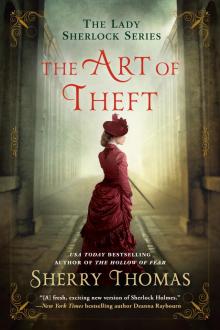 The Art of Theft
The Art of Theft The Magnolia Sword: A Ballad of Mulan
The Magnolia Sword: A Ballad of Mulan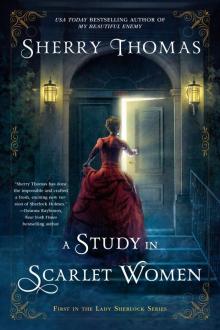 A Study In Scarlet Women
A Study In Scarlet Women The Hollow of Fear
The Hollow of Fear The Magnolia Sword
The Magnolia Sword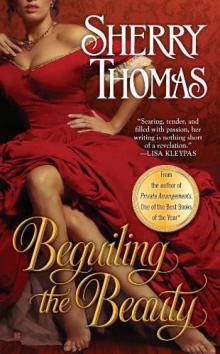 Beguiling the Beauty ft-1
Beguiling the Beauty ft-1 The Heart is a Universe
The Heart is a Universe The Hidden Blade: A Prequel to My Beautiful Enemy (Heart of Blade)
The Hidden Blade: A Prequel to My Beautiful Enemy (Heart of Blade)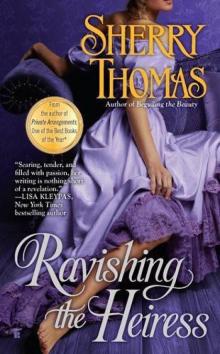 Ravishing the Heiress ft-2
Ravishing the Heiress ft-2 The Immortal Heights
The Immortal Heights The Hidden Blade
The Hidden Blade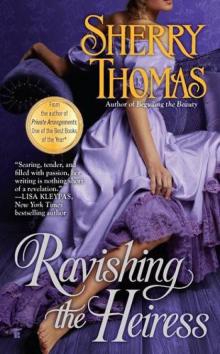 Ravishing the Heiress
Ravishing the Heiress Tempting the Bride
Tempting the Bride The Luckiest Lady in London
The Luckiest Lady in London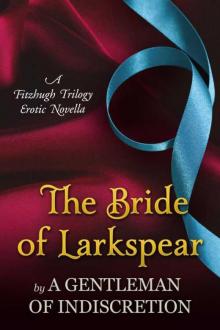 The Bride of Larkspear: A Fitzhugh Trilogy Erotic Novella
The Bride of Larkspear: A Fitzhugh Trilogy Erotic Novella Claiming the Duchess
Claiming the Duchess The One in My Heart
The One in My Heart His At Night
His At Night A Dance in Moonlight
A Dance in Moonlight A Conspiracy in Belgravia
A Conspiracy in Belgravia Not Quite a Husband
Not Quite a Husband